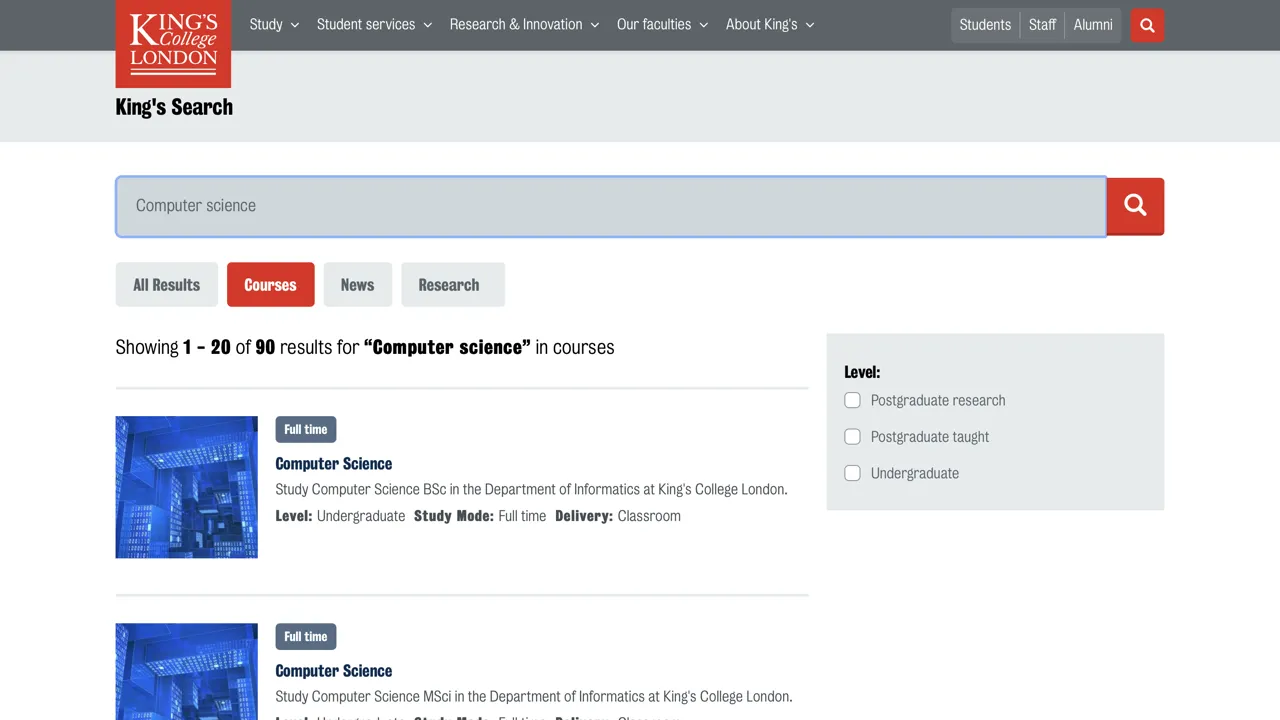
King's College London
A public research university and one of the highest ranking UK universities in the world.
About King's College London

Founded by King George IV and the Duke of Wellington in 1829, KCL has a claim to being the third oldest university in England. A constituent college of the University of London, it is one of the highest ranking UK universities in the world.
Headquarters
LondonIndustry
Higher educationEmployees
850Contensis has powered the website of King’s College London (KCL) since 2010. In that time the higher education sector has changed dramatically – along with the needs of the university’s stakeholders, staff and students. But, as the university has evolved, so has Contensis, allowing the team at King’s to use the latest digital tools and techniques without having to go through a lengthy and expensive replatform.
Contensis supports a truly agile and iterative approach
Contensis allows KCL to store any type of structured content and use the Contensis Delivery API to deliver it quickly and efficiently to their front-end React sites.
Separating content storage from presentation and using robust and flexible APIs to deliver their content allows KCL to take a truly agile and iterative approach to managing their content and web products.
According to the product manager at King’s, Contensis’ move to an API-first CMS couldn’t have come at a better time. “The newer React model means we can throw many developers at work. These can all be remote – essential now with Covid – with a lower risk of change failure,” he explains. “Version control for example, allows for more changes to be pushed out, as any problem can be rolled back if needed. Having a development environment allows us to make changes with more confidence.”
And, because Contensis allows you to develop your sites in any programming language, there is true flexibility in choosing the technology stack – meaning you can choose the technologies that suit the skills of the developers you have in your team.
For KCL, using the Jamstack alongside Contensis allows them to easily deliver on the high expectations of their users, whilst also giving their developers the best possible development experience.
At the end of each sprint, or at a time the team chooses, they can simply tag a build of their block with a release number, and push it out to production in just a couple of minutes.
As time has gone on they have also introduced other tools, such as feature branches in the source code, which ensure that they can still safely develop new features alongside other developers whilst also being able to release minor fixes and changes at any time.
Search is included as standard
Like all universities, one of King’s key requirements is a fast, accurate, and all-encompassing search. Staff, students, and prospective students need to be able to find course information, research material and other content from across the university’s departments quickly and easily. This can be a challenge in a decentralised organisation where many websites, apps, and portals are published and maintained by a number of different teams on a variety of platforms.
The team at KCL achieve this by storing all of their content in Contensis – even that originally created on other platforms. As soon as King’s push any type of content into Contensis, whether through an API or curated by their authors, the data is immediately available to bring into any type of search. Their whole search offering, which they previously needed a completely separate product to facilitate, now runs entirely off the Contensis Search API.
“It’s fast, reliable and already there! I think universities overthink search and end up with complex solutions that are hard to manage,” says the university's product manager. “Users want to enter a keyword or keywords and get relevant results. The more you try to fudge the results or create loads of filters, the worse I think the product becomes. We can control output, and we can create sub-searches such as courses as needed, but it’s simplicity and speed that win out in the end.”

KCL's whole search offering now runs entirely off the Contensis Search API.
A more modern, stable, and higher-performing service
The key to King’s ongoing success with Contensis has been their move from running the CMS on-premise on their own infrastructure to the Contensis cloud platform. Using the cloud service has freed up the team at KCL to innovate and improve rather than use valuable resources to maintain their own infrastructure.
“On-premise, we struggled to move CMS forward and keep it up-to-date, and therefore the CMS was often 18-24 months behind the supported version,” says their product manager. This frees our team up to develop and improve, rather than just keeping the sites running.”
“Now we’re using the cloud platform, we are able to run a modern service that is much more stable and higher performing. This frees our team up to develop and improve, rather than just keeping the sites running.”
“Not having to worry at all about the application, database, servers and so on has meant we no longer rely on multiple parts of our IT that we had no control over,” he explains. “Having one single contact in the event of an issue has improved incident management. This, added to the fact the system is more reliable, means there is more faith in the system all round.”
“Contensis works”
So, after a decade, why would their product manager continue to recommend Contensis?
“Contensis works. It can cope with the often complex structures needed within the university and change as we do. It’s also always evolving into a product more in line with our needs. There are easy channels to access support and product development. This enables customers to get the features they need, not just what the developers want to build,” he says. “Contensis and the hosting is reliable and, now we are using React more, getting and retaining people to develop our sites is much easier – it’s no longer a small specialised pool of people.”

